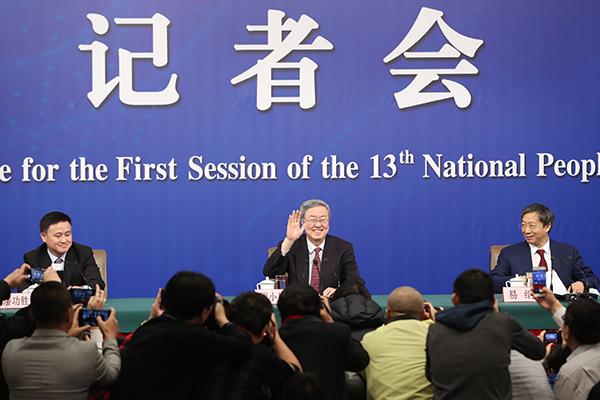
Zhou Xiaochuan (center), governor of the People’s Bank of China, answers reporters’ queries at a news conference on March 9 on the sidelines of the first session of the 13th National People’s Congress.[Photo/China Daily]
China’s foreign exchange reserves will basically remain stable given the stabilizing economic growth prospects and the yuan’s exchange rate, the central bank said on March 9.
Zhou Xiaochuan, governor of the People’s Bank of China, said the country’s forex reserves have been affected by international asset prices but there have not been any major changes in China’s balance of international payments.
The country saw its forex reserves fall in February to $3.134 trillion, down $26.98 billion from the previous month, following 12 consecutive months of rises, according to data from the State Administration of Foreign Exchange.
“The value of the forex reserves moves in line with the price change of stocks and bonds in which they (forex reserves) are invested,” Zhou said at a news conference on the sidelines of the annual session of the 13th National People’s Congress. “But there have not been any major changes in China’s balance of international payments and foreign exchange condition,” Zhou said.
Pan Gongsheng, vice-governor of the central bank and head of the SAFE, said the recent rise of the dollar index and the decline of international bond and stock prices are the two main factors that led to the drop in China’s forex reserves in February.
China has stepped up scrutiny of its foreign exchange market after the market experienced some big shocks, Pan said, noting that the regulator has adopted a macro prudential approach on external debts and required banks to put aside risk reserve in forward settlement of foreign exchange.
The country has also stepped up crackdown on transaction fraud and illegal money changing through “underground banks” while increasing the verification on the authenticity of cross-border payments, Pan said.
While China has basically exited countercyclical adjustments on capital outflows, Pan stressed that the country will maintain its policy consistency on supervision measures pertaining to cross-border capital movement.
China’s export growth rebounded to 44.5 percent year-on-year in February, the fastest pace in three years. Import growth fell to 6.3 percent year-on-year, resulting in a trade surplus of $33.74 billion against market expectations of a deficit.
Zhao Yang, chief China economist at Nomura Securities, said in a research note that the robust January-February trade data suggest that the yuan could be supported by a relatively benign flow backdrop and favorable global growth outlook in 2018, especially if the Chinese authorities manage to engineer a gradual and controlled deleveraging process to stabilize the economy.
